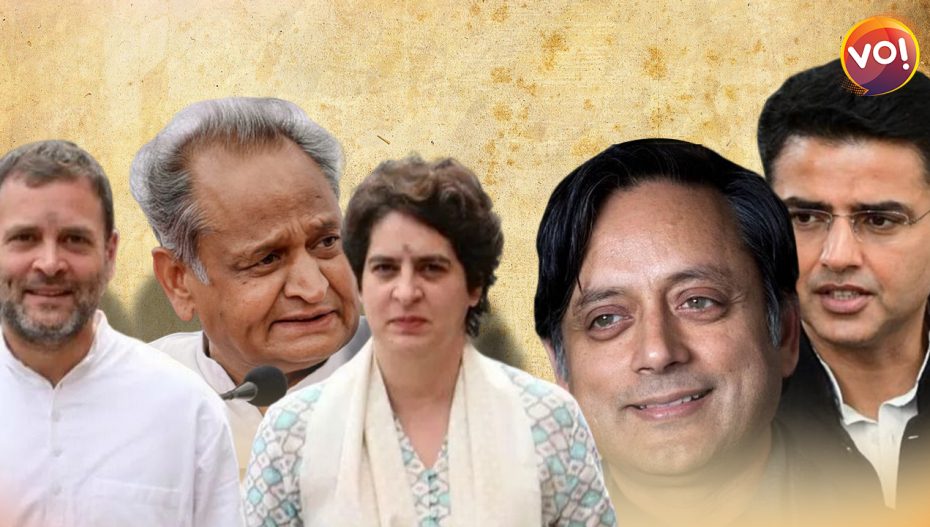New Delhi, Sept. 23:
As the process for the election of the Congress president kicks in on Saturday with the filing of nominations, the whirligig of events will have a bearing on where the party is headed.
First, the will of the Gandhis should prevail yet again. The party’s narrative still revolves around the Gandhi family. That said, the Congress won’t be unmindful of a brewing revolt. The G-23 group, which has been demanding organisation-level changes, had written to Sonia Gandhi, stressing the need for internal reforms.
The Congress’s lack of urgency to bring in the right changes has resulted in the departure of at least two signatories, Kapil Sibal and Ghulam Nabi Azad.
It’s a sign that the First Family’s authority is no more absolute. Ultimately, the Gandhis called for an election to the party president’s post. The Gandhi Parivar made it clear that they wouldn’t contest for the president’s post—Sonia Gandhi was only the interim president after her son Rahul Gandhi demitted office—despite the chorus urging them to take over the mantle.
It was an acknowledgement of the need to free the Congress from the straitjacket the party was fitted into for decades to secure their own interests.
Secondly, conventional Congress wisdom has it that the next elected president will end up being a proxy office-holder. It’s thought the Congress president, in any case, will function as the Gandhis’ surrogate, much the same way Manmohan Singh did 10 years ago (although this is debatable).
Thirdly, ambiguity shrouds the prelude to the polls. Sonia has made it clear that she was a “neutral onlooker” and would not endorse anybody’s candidacy. Thiruvananthapuram MP, Shashi Tharoor, who threw his hat in the ring, called on her to discuss his intent. She heard him out, despite Tharoor being a G-23 member. However, Ashok Gehlot, the Rajasthan chief minister, who seems like the undeclared official nominee, was reportedly told off by Sonia when he broached the subject of who would replace him in Jaipur.
He was bluntly told it was not his problem. It appeared as though Gehlot had queered the pitch for himself, suggesting he didn’t want to forfeit the only piece of political real estate he has in Rajasthan. Gehlot apparently was opposed to his former deputy CM, Sachin Pilot, getting the role in Rajasthan, should he vacate the Chief Minister’s post.
Rahul Gandhi, however, dismissed speculations, stating the ‘one-person-one-post’ norm formalised at the Udaipur conclave was sacrosanct, which implied that Gehlot would have to give up the Jaipur throne, regardless of who his successor was.
The ongoing saga will soon reach a conclusion but who are the main actors in this political theatre?
-The Gandhis: It’s impossible to conceive of a beginning, middle and end without the family, whether they intervene or not. Their intent to make the Congress’s working “more democratic and transparent” will be put to test. This could be an unrealistic expectation, given the cast-iron framework of the party’s structures.
We will never know if they have truly distanced themselves. The organisation and the functionaries that populate it—the AICC delegates who make up the electoral college—owe their jobs to the Gandhis and their cherrypicked people.
Rahul’s Bharat Jodo yatra was not a coincidence. It reinforces his position as the Congress’s frontline leader in the elections, a faint replica of the model crafted by the BJP. PM Narendra Modi is the face while JP Nadda minds the organisation. The division is not so straight in the BJP because Modi also controls the organisation through a proactive Amit Shah.
Similarly, Rahul and, to an extent, Priyanka Gandhi Vadra will work on the organisation through their trusted appointee, KC Venugopal, a general secretary. In any case, many of the PCC chiefs, including Bihar’s Madan Mohan Jha and Maharashtra’s Balasaheb Thorat, owe their jobs to the Gandhis and would want to demonstrate their loyalty to the family.
-Ashok Gehlot: He was discovered by Indira Gandhi who was impressed with his intuitive ability to understand the organisational apparatuses. He has been a Gandhi family loyalist, though every Congress loyalist is first and foremost a hard-core politician. Gehlot is no exception and has held on to Rajasthan for a long time, despite not belonging to any of its dominant castes. Pilot’s arrival has muddled Gehlot’s dominance. Like Gehlot, Pilot is also from the Other Backward Class but represents one of the more influential sub-castes, the Gujjars, who count in quite a few constituencies. Should Gehlot be elected as the president, his son Vaibhav’s future might become uncertain.
-Sachin Pilot: His apparent attempt to destabilise the Gehlot dispensation has cast doubts over his commitment to the Congress. The party suspects the BJP had a hand in it. Gehlot foiled the attempt and scored brownie points with the “high command”. Pilot lost his posts as the deputy CM and the PCC chief and was out in the cold. Gehlot’s exit from Rajasthan might be Pilot’s moment of redemption.
-Shashi Tharoor: A veteran of contests as noteworthy as the one in which he challenged South Korean politician Ban Ki-moon for the UN presidency and lost, Tharoor is up for a good fight. He was elected thrice from Thiruvananthapuram.
Although the second election in 2014 was tough, he won. Notwithstanding the urbane image that endears him to urban young as well as opinion-moulders, Tharoor is said to relate well with his constituency’s rural folk in the fishing areas.
Despite coming to the Congress with a cachet few have, Tharoor only made it as a junior minister in Manmohan Singh’s ministerial council. He is not a member of the Congress Working Committee or the Central Election Committee, indicating that he is still not in the party’s big league. Tharoor has not distanced himself from the G-23. It won’t be easy if he aspires to leap from the second rung to the Congress’s elite strata.
Also Read: Congress President Election: Push For One Person, One Post












